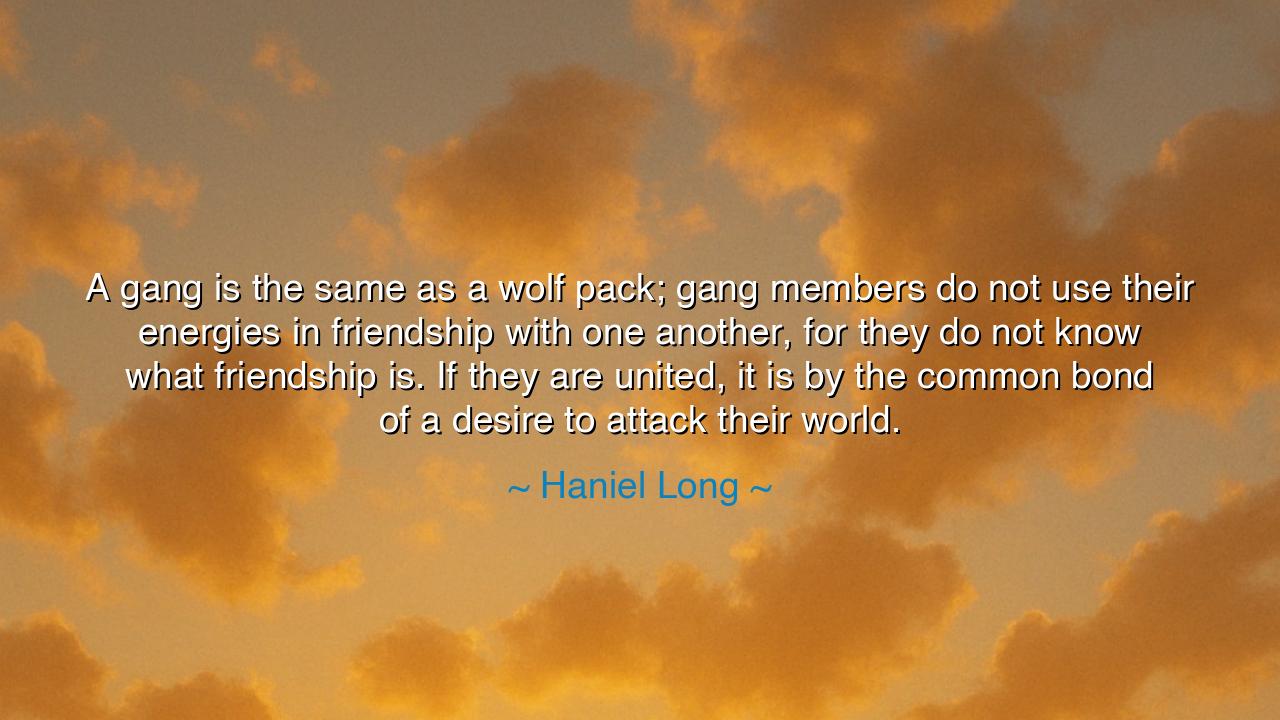
A gang is the same as a wolf pack; gang members do not use their
A gang is the same as a wolf pack; gang members do not use their energies in friendship with one another, for they do not know what friendship is. If they are united, it is by the common bond of a desire to attack their world.






"A gang is the same as a wolf pack; gang members do not use their energies in friendship with one another, for they do not know what friendship is. If they are united, it is by the common bond of a desire to attack their world." These words by Haniel Long carry a deep and powerful truth about the nature of unity and loyalty in environments shaped by violence and aggression. He compares a gang to a wolf pack, both groups bound not by the sacred ties of friendship, but by a primal, shared need to survive and conquer. Yet in this unity, there is no true camaraderie, no foundation built on mutual respect or affection, only a common goal born of desperation or a need for power. In the case of the gang, the bond is not one of friendship, but one of shared aggression, each member drawn together not by affection but by the desire to challenge the world that has set them apart.
In the ancient world, the idea of unity among a group was often marked by a sacred bond of brotherhood and mutual trust, seen in the warrior bands of Sparta or the Roman legions. The Spartans, for example, were famed not only for their martial prowess but for their unbreakable ties of loyalty and friendship. A Spartan warrior fought not only for his survival but for the survival of his brothers-in-arms. Their unity was forged in friendship and mutual sacrifice, where each man’s honor and well-being were intertwined with the others. This type of unity was bound by trust and love, the kind that comes from a shared journey and a mutual desire to build something greater than oneself.
Contrast this with the nature of the gang as described by Long. Unlike the Spartans, a gang is not bound by love, honor, or shared ideals; instead, its unity arises from a shared aggression toward the outside world. The gang, much like a wolf pack, is bound not by friendship but by a common desire to attack, to push back against a world that they feel has rejected or wronged them. The wolf pack, while appearing united in purpose, is driven by instincts, survival, and the need to dominate rather than to build a community. The members of a gang, like the wolves, may appear loyal to one another, but their loyalty is tied not to friendship but to a shared mission of conflict and revenge.
Consider the story of the gladiators in Rome, warriors forced into battle for the amusement of the ruling class. Though they fought alongside each other, the bond between them was not one of true friendship but of mutual survival. Many gladiators formed temporary alliances in the arena, but their loyalties were always shaped by the need to survive, to outlive the others, and to fight another day. Their unity was born not of a desire for mutual support, but of a shared desire to overcome the brutal world they inhabited. In this sense, their bond, like that of a gang, was not rooted in friendship but in a shared struggle against a world that sought to break them.
What Haniel Long illuminates for us is that while gangs may present an image of unity, their foundation is built on hostility rather than friendship. This unity is fragile, held together not by mutual affection or respect, but by the shared experience of anger and the desire to rebel. The gang does not know the true meaning of friendship because, in their hearts, they are not seeking to build something together for the sake of love or trust, but to tear down a world that has wronged them. In this way, the gang is a reflection of a darker path—one where survival is at the forefront, and love is a foreign and impractical notion.
The lesson we can take from Long’s words is clear: true unity—the kind that endures and creates strength in the face of adversity—is built on friendship, respect, and shared values. The strength of a community lies not in its ability to attack the world, but in its capacity to build and protect each other through love and trust. The gang and the wolf pack may survive through their shared aggression, but their bond will always be shallow, built on a common enemy rather than on mutual understanding and support.
In our own lives, let us strive to build connections not based on resentment or the desire to tear down others, but on the values of friendship, respect, and collaboration. The true unity that will stand the test of time is not one that is forged in the heat of conflict, but one that is nurtured in the fertile ground of understanding and love. When we build relationships based on these values, we move away from the fragile alliances of gangs and wolf packs and move toward something far more enduring—a community that is bound by the desire to support and uplift one another. Let us choose the path of friendship, for in it lies the greatest strength of all.






AAdministratorAdministrator
Welcome, honored guests. Please leave a comment, we will respond soon